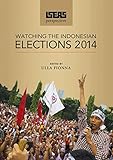ISEAS Perspective : Watching the Indonesian Elections 2014 / ed. by Ulla Fionna.
Material type: TextPublisher: Singapore : ISEAS Publishing, [2015]Copyright date: 2015Description: 1 online resource (196 p.)Content type:
TextPublisher: Singapore : ISEAS Publishing, [2015]Copyright date: 2015Description: 1 online resource (196 p.)Content type: - 9789814620833
- 9789814620840
- 324.9598704
- online - DeGruyter
| Item type | Current library | Call number | URL | Status | Notes | Barcode | |
|---|---|---|---|---|---|---|---|
 eBook
eBook
|
Biblioteca "Angelicum" Pont. Univ. S.Tommaso d'Aquino Nuvola online | online - DeGruyter (Browse shelf(Opens below)) | Online access | Not for loan (Accesso limitato) | Accesso per gli utenti autorizzati / Access for authorized users | (dgr)9789814620840 |
Frontmatter -- CONTENTS -- FOREWORD -- INTRODUCTION -- 1 THE GUBERNATORIAL RACE IN JAKARTA: Background and Implications -- 2 INDONESIAN PARTIES STRUGGLE FOR ELECTABILITY -- 3 WHO WILL BE INDONESIAN PRESIDENT IN 2014? -- 4 INDONESIAN PRESIDENTIAL ELECTION FORCING REJUVENATION OF PARTIES -- 5 RESISTING DEMOCRACY: Front Pembela Islam and Indonesia’s 2014 Elections -- 6 GETTING TO KNOW THE CONTESTANTS OF THE 2014 INDONESIAN PARLIAMENTARY ELECTIONS -- 7 A SNAPSHOT OF THE CAMPAIGNING IN INDONESIA’S 2014 LEGISLATIVE ELECTIONS -- 8 UNPACKING THE RESULTS OF THE 2014 INDONESIAN LEGISLATIVE ELECTIONS -- 9 INDONESIA’S 2014 LEGISLATIVE ELECTIONS The Dilemmas of “Elektabilitas” Politics -- 10 THE ISLAMIC FACTOR IN THE 2014 INDONESIAN ELECTIONS -- 11 VOTE-BUYING IN INDONESIA’S 2014 ELECTIONS The Other Side of the Coin -- 12 GAP NARROWS BETWEEN CANDIDATES IN INDONESIAN PRESIDENTIAL ELECTIONS -- 13 ANALYSING THE ECONOMIC PLATFORMS IN THE INDONESIAN PRESIDENTIAL ELECTION -- 14 INDONESIAN ISLAMIC PARTIES AFTER THE 2014 ELECTIONS Divided and Self-Centred -- 15 SAFEGUARDING INDONESIA’S PLURALISM: An Essential Task for Joko Widodo -- 16 JOKOWI’S KEY ECONOMIC CHALLENGE: Improving Fiscal Policy for Equitable Growth -- 17 CROSSING THE RIVER WHILE AVOIDING THE STONES: Jokowi’s Run-up to the Presidency -- 18 POST-ELECTIONS INDONESIA: Towards a Crisis of Government? -- EPILOGUE: JOKOWI’S FIRST MONTHS: Compromise Cabinet, Subsidy Cuts, and Corrupt Coalition
restricted access online access with authorization star
http://purl.org/coar/access_right/c_16ec
“As the euphoria fades from the Jokowi presidency, this timely book reviews the processes that brought him to the top, and the processes that have undermined his initial standing. The nineteen articles by ten writers provide views from along the way, starting with a chapter on the Jakarta governor elections from November 2012 and preceding through the key events up to a contemporary assessment in February 2015. Several major clues to the current disillusion are provided in accounts of the legislative elections and the presidential campaigns. Key topics are vote buying, the Islamic factor, economic platforms, pluralism, economic challenges. Max Lane points to deep alienation from politics and the emergence of new unions and a new political arena. The ISEAS team provides a range of events and analyses that will be most useful to all students of current Indonesian politics; clear, concise, insightful.” - David Reeve, Conjoint Associate Professor UNSW, ILTI Academic Coordinator ACICIS. “This book effectively captures the dynamics of Indonesian politics by focusing on the various phenomena surrounding the 2014 elections. It begins this political journey with an analysis of the implementation of local autonomy, and the birth of a leader brave enough to challenge extant political elites. It further explores the application of political culture in campaigns, the shortcomings of elected leaders, and the inadequacy of a state obliged to accommodate various interest groups. Beyond all these, this book proves that the political culture approach remains crucial in investigating Indonesia's political realities.” - Sukardi Rinakit, Political Analyst, Special Staff to President Joko Widodo
Mode of access: Internet via World Wide Web.
In English.
Description based on online resource; title from PDF title page (publisher's Web site, viewed 19. Oct 2024)


